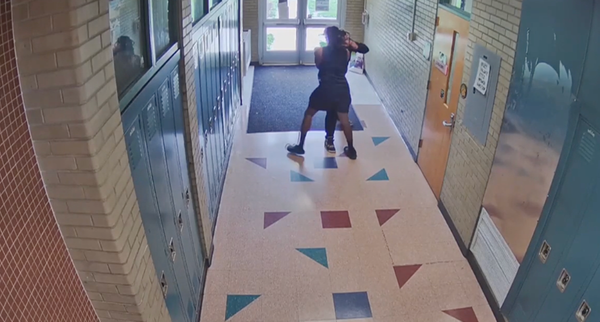
The drive to commercialise sport and commoditize players can seem all powerful but there is an equal and opposite force in sport which gets significantly less media spotlight yet continues to grow just as inexorably. How to describe it? We could call it the spirit and soul of sport. The intrinsic value that can’t be measured in transfer fees but has a greater and much longer lasting worth. Or simply the magic of sport. It may never be the hot topic on Match of the Day, but sport can never cut itself off from the fundamental human experiences at its core.
It’s the reason why we all love to watch, play and engage in sport, whether it’s the battle of the two Lukes in the gripping darts world championship final, Roger Federer’s sublime shots at Wimbledon, or those moments of joy that a crowd feels when watching their favourite team do the impossible in the dying seconds of extra time. We don’t always stop to question what is going on beyond the trophies and titles, but the BBC sports presenter Simon Mundie has written a book to help us understand it more.
Mundie has interviewed hundreds of athletes on his podcast Life Lessons. He discovered that it was not the medals that mattered most to his interviewees. It was something less tangible but much more powerful. Mundie has gathered some of the best stories and drawn out the ideas from them in his book Champion Thinking: How to Find Success Without Losing Yourself.
Mundie explores themes of “acceptance”, “unconscious beliefs” and “the joy of losing yourself”. It’s no surprise we connected strongly in the podcast about my book The Long Win. In my own experiences over a decade as an Olympic athlete, I recognised the journey that started off with chasing the medals that everyone around me said were what mattered most soon led to a search for greater meaning.

It’s a story echoed by so many athletes. Victoria Pendleton felt “empty” and “numb” when she won gold at the Beijing Olympics. Andrew Strauss asked “Is that it?” after his side became the No 1 Test team in the world for the first time. Tyson Fury spoke of “the void” the morning after beating the world champion Wladimir Klitschko. Adam Peaty described the destructive spiral of “constant chasing”, saying: “I always used to think success and happiness were defined by the gold medal or the world record. I try not to live by that any more.” The England World Cup winning fly-half Jonny Wilkinson spoke of his depression and hopes that the next cap or title would bring joy, but in his own words, “it’s never enough”. Mundie considers what these athletes who achieved the top position in sport were missing.
Wilkinson features in Mundie’s book and he has gone to great lengths to rethink sport. His podcast “I Am” marks a journey of self-discovery via quantum physics, Buddhism and philosophy. Wilkinson, whose extra-time drop goal sailed over the bar to win the tournament for England in 2003, dismantles all that we think we know about sport as brutally as he ever tackled his opponents on the pitch.
Wilkinson attacks the common cliches that defined him as exceptionally dedicated, epitomised by the hours he spent practising his goal kicks long after his teammates had gone home. He reveals how this obsessive behaviour actually caused huge wear and tear on his body and was driven by fear, insecurity and “a gap in self-trust”.
Wilkinson and Mundie interviewed and became enthralled by the philosopher and “spiritual teacher” Rupert Spira. Spira’s insights are about as far as you can get from those discussed on the Match of the Day sofa. Yet Spira offers answers to make sense of sport in a way the scoreline and the endless caps and titles never could for Wilkinson. Spira supports Mundie in his search to find “the true gold of sport”, expanding his understanding of experiences of “flow” in sport.
Mundie’s final and most compelling chapter explores sporting moments of joy and transcendence, of inhuman possibility, of a greater form of intelligence, of the universe’s magic. Mundie references Wilkinson’s winning drop goal in 2003, Damon Hill’s incredible drive at Suzuka in 1994, Frankie Dettori’s seventh and final ride at Ascot in 1996 and Goldie Sayers’ euphoric experience of throwing the javelin at the Beijing Olympics. In each of these moments, the athletes use similar language: Dettori says: “I felt like I was there, but I wasn’t there.” Hill says: “It’s as if I was not driving the car, something else was driving the car.” Wilkinson says: “It wasn’t me kicking it – it was a knowing of it.”
Groundbreaking psychologist Mihaly Czikszentmihalyi, who coined the term “flow” for these moments of beauty, described this as a “transformation of time”. It’s the ultimate human means of time travel available to us all in these moments. It’s easy to see how we all long for that in our lives.

Mundie’s writing resonates, articulating what I instinctively felt but haven’t always known how to explain. When asked to share the best moment of my rowing career, others expect the answer to be a medal-winning race. But my mind always jumps to a few truly joyous moments on a training camp on a beautiful Italian lake surrounded by mountains where things suddenly clicked and our rowing boat took off, flying along seemingly with no effort even though we were rowing flat out.
Spira explains experiences of fans and spectators who feel inspired by witnessing a greater force at play. He reinterprets that moment when the crowd feel deep joy as a goal is scored. He explains that our minds tell us that it’s because a goal is scored and so we associate joy with the scoring of a goal, further reinforced by commentators and others around us.
But Spira reads that moment differently. Up to that point, we have been focused on waiting for a moment we want to happen, anticipating a goal. When the goal actually happens, it’s the release and relief from that anticipation that creates the joy. We are no longer suspending joy until something happens in the future. We can freely connect to the present moment. Through being so intensely present and connected, we lose a sense of being separate individuals and feel part of something bigger than ourselves. It’s powerful stuff, a world away from the typical sofa punditry we get.
The mindfulness-based programmes that The True Athlete Project (a brilliant sporting charity I support) bring to elite athletes, coaches, grassroots sports clubs and leaders in sport are sometimes scoffed at. Leaders presume that athletes won’t be interested in exploring their intrinsic values or identity beyond sport or that coaches won’t be interested in connecting to the work that they do beyond winning matches. Yet time and time again, the chief executive, Sam Parfitt, is blown away by the instinctive connection to this approach and common sense of relief at finding what they’ve been missing for so long. The performance expert Owen Eastwood described to me his work developing high-performing teams as a “spiritual challenge” and said that despite warnings that players would resist his approach, he had yet to find an athlete who hadn’t longed to connect to something greater than themselves.
Sport is a natural context for human innovation. Many athletes and coaches are realising that our physical limits are finite but there is still so much to be gained from exploring the mind more deeply. I hope in 2024 that our commentators, journalists and pundits will also take a moment to challenge the assumptions they are making about what has most value in the sport that awaits us. Mundie’s book offers a good starting point for them to explore this further. And I’d love to see Spira on Lineker’s Match of the Day sofa.
Champion Thinking: How to Find Success Without Losing Yourself is published by Bloomsbury Tonic at £18.99. Buy it at guardianbookshop.com for £16.71







